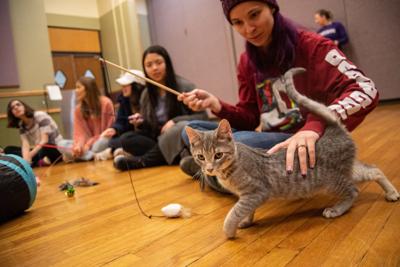Q: Last week, a tiger in the Bronx Zoo tested positive for coronavirus, and scattered reports around the world say that some pets have also tested positive for the virus. Are my pets safe?
A: Yes, it appears that pets are not at significant risk for catching COVID-19, the disease caused by coronavirus, but health and veterinary officials still are advising pet owners to take basic precautions around their pets.
Nadia, a Malayan tiger in the Bronx Zoo, as well as several other big cats, began showing COVID-19 symptoms earlier this month, after suspected contact with a zookeeper carrying the virus. Of the cats that were tested, only Nadia tested positive for the virus.
The World Health Organization reports that it has seen a few reports of pets of COVID-19 patients becoming infected with the virus, and the World Organisation for Animal Health says preliminary studies show some animals may be susceptible to infection, although those studies show they may not develop the same symptoms or disease humans have displayed.
Dr. Kenneth Harkin, a veterinarian and section head of clinical sciences at K-State’s College of Veterinary Medicine, said early studies around the world show that pets aren’t at a high risk for contracting or becoming seriously sick from the virus.
“I’m going to preface any answer with the caveat that this is a newly emerging viral disease and there is still so much that needs to be learned that any question I answer may be proven wrong in the future,” he said. “I am certain that many read the story of the tiger and lions at the Bronx zoo. There are likely readers who see that story and wonder if their pet cats are going to get COVID-19 from them. But tigers and lions are not pet cats and they are often susceptible to infectious diseases that our pet cats will never contract, such as canine distemper. Infection in tigers and lions does not imply that our pet cats are at the same risk.”
Harkin said that studies show that dogs do not appear to be susceptible to the novel coronavirus, and there is no evidence they’ve played any role in transmission of the virus. On the other hand, a few studies show some transmission between co-isolated cats. However, one of those studies deliberately infected cats, and while that resulted in virus replication in the cats’ upper respiratory tracts, no cat developed severe disease from the virus, even with heavy doses of it.
Harkin said the chances of a pet becoming infected with the virus from exposure to their owners is remote to nonexistent.
“It is also doubtful that with natural exposure that cats would play a role in disease transmission to other cats or humans,” he said. “Other than a dubious report of a cat in Belgium that was ill and tested positive, there do not appear to be any other cases of natural exposure that resulted in disease in cats nor any positive test results.”
“It doesn’t seem that any special precaution is needed at this time with our pets,” he continued. “I can certainly reiterate what has been stated and seems intuitive, which is that if one is sick they should avoid close face-to-face contact with their pets.”
Some other happy news: as for Nadia and the other cats, the Bronx Zoo’s chief veterinarian reports they’re getting better each day and should make a full recovery.
You can submit a question to this column by e-mail to questions@themercury.com, or by regular mail to Questions, P.O. Box 787, Manhattan, KS 66505.



















